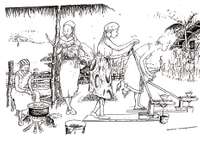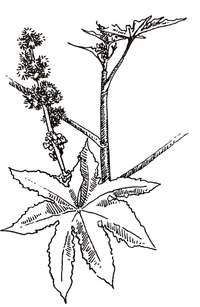OIL PROCESSING is one book in the Food Cycle Technology series. See review in Chapter 10, Food Science.
- Back Issues of "Oilseed Press" Available
- How Can I Get Palm Oil from Oil Palms?
- Castor Bean Oil
- A Few Small-Scale Press Resources and Manufacturers
BACK ISSUES OF "OILSEED PRESS" AVAILABLE from Appropriate Technology International, 1828 L Street NW, Washington, D.C. 20036, USA; phone 202/293-4600; fax 202/293-4598; e-mail atintl@igc.apc.org. "Oilseed Press" has ceased publication, but the journal written to "promote small-scale oilseed processing in Africa" may be replaced by a new one from the Africa offices. ATI also produced a 20-minute video on manufacturing and promoting ram presses called "The Regional OILS Project: A Quiet Revolution," available from USAID or ATI/OILS offices around Africa.
The September 1994 issue had some helpful features excerpted here. The picture shown here is from a ram press poster by artist Salimini Sille printed in this issue. Sunflower seedcake (SFS) is used as an affordable feed for ruminants, pigs, and chickens. SFS is high in protein (25-35%) and phosphorous, which are often lacking in animal diets based on crop residues. Optimize digestion and reduce waste by milling the seedcake particles to smaller sizes before feeding. Combine the seedcake with energy sources such as cereal grains and residues for best results. The following guidelines were given: "Cattle: 2 kg of protein-rich SFS will dramatically increase production if the current diet is high in roughage. Swine: a mix of one part SFS to one part cereal grain or residues represents a good balance of protein, energy, vitamins, and minerals. Poultry: A mixture of 30% SFS and 70% cereal residue will provide a sufficiently nutritious ration for moderate production."
chickens. SFS is high in protein (25-35%) and phosphorous, which are often lacking in animal diets based on crop residues. Optimize digestion and reduce waste by milling the seedcake particles to smaller sizes before feeding. Combine the seedcake with energy sources such as cereal grains and residues for best results. The following guidelines were given: "Cattle: 2 kg of protein-rich SFS will dramatically increase production if the current diet is high in roughage. Swine: a mix of one part SFS to one part cereal grain or residues represents a good balance of protein, energy, vitamins, and minerals. Poultry: A mixture of 30% SFS and 70% cereal residue will provide a sufficiently nutritious ration for moderate production."
The same issue addressed the process of introducing oilseed presses into new areas. ATI has found that sending plans or even a prototype machine is simply not effective to begin manufacturing and using ram presses. Some of their observations follow. First of all, a feasibility study should be done to assess the suitability and profitability of oilseeds for growers and small-scale processors before any technologies are introduced. Quality seed, with a high oil content and soft shells which will not damage the oil press, is essential. Individual attempts to improve the ram press have often resulted in heavier, harder to operate, and more expensive designs which do not actually improve performance. Learning to manufacture a press usually requires an intense week of hands-on training; copying from plans is simply not enough. The extension activities for sustainable dissemination are the most complex step, requiring a concerted effort. Contact ATI at the above address for the OILS address near you in Africa. They may be able to help you evaluate the potential of oilseeds in your area.
HOW CAN I GET PALM OIL FROM OIL PALMS? Lennie Clement in Nigeria asked this after our article about using palm oil to control bruchid beetles in stored beans. The following is summarized from the Liklik Buk.
The oil may be extracted easily at the village level, and used for cooking, or in making soap or oil for lamps. Palm oil is very rich in vitamin A. First, harvest nuts in bunches. A chisel with a long handle might be helpful in cutting the main stem of the bunch. Break nuts off the cluster and wash them. Boil them for 30 minutes in a large can [which I presume contains some water]. Squeeze the boiled nuts in a screw-type press. The juice that comes out is mostly water, but also contains considerable oil. Some small bits of pulp will also be present. When the oil rises to the top, pour it off. Filter the oil by pouring it through a sieve to remove bits of pulp. If oil will be used immediately, no further treatment is needed. If the oil is to be stored for weeks or months, it must be heated briefly to sterilize it. The authors did not know how hot, but recommended it be quite hot but not allowed to burn. It is common in West Africa where a screw press is not available to cook the nuts in a drum and skim off the oil as it rises to the surface. This is less efficient than using the oil press.
Palm kernels can be fed to pigs, which quickly learn to crack the shell. Too many palm kernels causes a very yellow fat, and the high fiber slows growth. The high-yielding oil palms produce well with this process. Other oil palms may or may not contain enough oil to be worthwhile.
CASTOR BEAN OIL was the subject of a question from Laura Raab in Kenya. She inquired about using castor bean oil to treat constipation in the village. While  it is used medicinally in some areas, castor bean contains the deadly poison ricin. The CRC Handbook of Alternative Cash Crops says: "The seeds contain 2.8-3% toxic substances, requiring 2.5-20 seeds to kill a man, [although] chewing a single seed may be fatal to a child." Processed castor oil can be used in foods. How is that done? Oil Processing states that "Only castor oil which has been processed using sophisticated technology can be used for medicinal purposes." Exercise much caution when working with castor oil. (Better treatments for constipation include high-fiber foods like bran or cassava, drinking lots of liquids, eating fruit, or milk of magnesia.)
it is used medicinally in some areas, castor bean contains the deadly poison ricin. The CRC Handbook of Alternative Cash Crops says: "The seeds contain 2.8-3% toxic substances, requiring 2.5-20 seeds to kill a man, [although] chewing a single seed may be fatal to a child." Processed castor oil can be used in foods. How is that done? Oil Processing states that "Only castor oil which has been processed using sophisticated technology can be used for medicinal purposes." Exercise much caution when working with castor oil. (Better treatments for constipation include high-fiber foods like bran or cassava, drinking lots of liquids, eating fruit, or milk of magnesia.)
We came across another use of castor seeds in the 1990 #5 Baobab. People in Cameroon use castor oil as an insecticide spray against a variety of pests. The directions are as follows: "Take 4 glassfuls of seeds with the husks still on them (0.5 kg) or 5 glasses of shelled seeds; crush or grind them. Heat the powder for 10 minutes in 2 liters of water. Then add 2 large spoonfuls of kerosene and a small amount of soap. This mixture is filtered, diluted in 10 liters of water and used immediately."
A FEW SMALL-SCALE PRESS RESOURCES AND MANUFACTURERS. Watch future issues of EDN for more on the topic of oil crops and oil processing. Appropriate Technology Vol. 20, No. 2, September 1993 (pp. 17-18) has an extremely helpful chart on "Principles of Oil Extraction" for seeds/beans, nuts, and fruits. Small-Scale Food Processing (158 pp.) and Tools for Agriculture (238 pp.) help you identify and find the most suitable technology and equipment for your needs--including oil processing. The chapters give insights on the topic and list sources for palm nut crackers and a wide variety of presses and expellers in many countries. [The books are available free from CTA only for nationals of the 70 ACP countries (most of Africa and the Caribbean, and several Pacific Islands); write CTA, Postbus 380, 6700 AJ, Wageningen, Netherlands. Others can order the books from Intermediate Technology Publications, 103-105 Southampton Row, London WC1B 4HH, UK; fax +44 171 436 2013, or in the US from Women, Ink., 777 United Nations Plaza, Third Floor, New York, NY 10017; fax 212/661-2704; each book costs œ30 or US$58.50 plus postage.]
There are many manufacturers of oil expellers, and choosing one which is appropriate is an important task requiring good information and careful evaluation. Regular availability of local seed is critical, and the new equipment may carry challenges of their own. You will probably want to consult with both local organizations and IT, CTA, FAKT, or other groups listed in this book who offer specialized assistance on technical subjects. Here we list just a few contacts for those who want to pursue this independently.
CECOCO has a powered oil expeller; write P.O. Box 8, Ibaraki City, Osaka 567, JAPAN. The Sundhara expeller was developed in Nepal through collaboration with FAKT; contact H. Martin Dietz, Reinhold Metzler, and Carlos Zarate at FAKT, Buro Furtwangen, Stephan Blattman Str. 11, 7743 Furtwangen, GERMANY; fax +49 772 35373. The KOMET spindle-press uses 'cold' pressing (no heating required); contact IBG Monforts GMBH & Co., Postfach 200853, D4050 Monchengladbach 2, GERMANY. The ram press, inexpensive and operated by one person, was developed in Tanzania; contact Appropriate Technology International, 1331 H St NW, Washington, D.C. 20005, USA. For the Tinytech from India, contact Technical Enquiry Unit, Intermediate Technology, Myson House, Rugby CV21 3HT, UK, or Tinytech Plants, Near Mallavia Wadi, Gandal Road, Rajkot - 360 002, INDIA. A variety of table oil expellers are offered by the S.P. Engineering Corporation, P.B. No. 218, 79/7, Latouche Road, Kanpur, INDIA (last contacted ECHO in 1983) or Sheonagar, Bahraich - 271 801, U.P., INDIA. There are many, many more contacts; be sure to check with local organizations first.